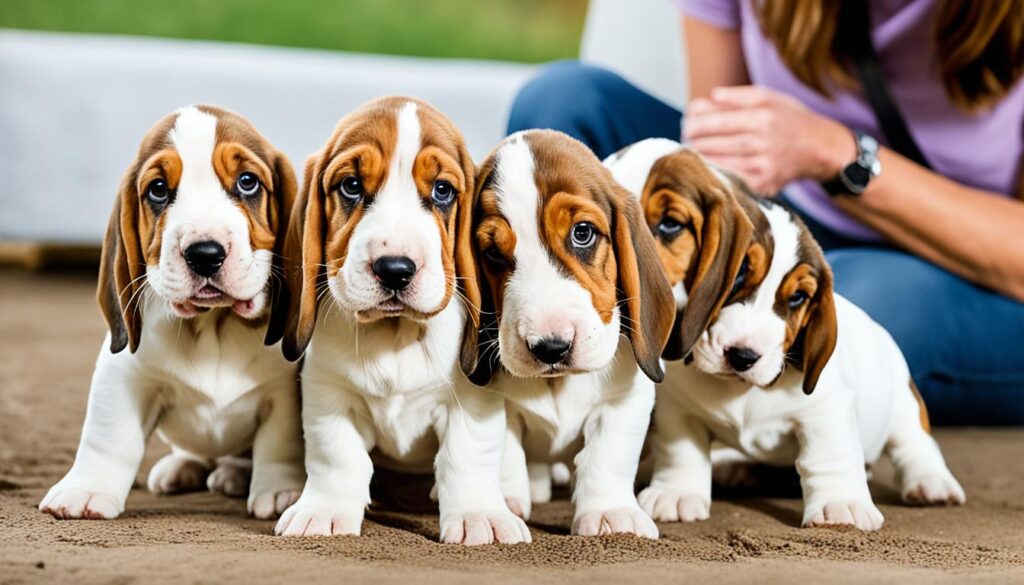Did you know that Basset Hounds are known for having one of the strongest senses of smell among all dog breeds? With a staggering 220 million scent receptors in their noses, they have an extraordinary ability to track scents and detect hidden objects.
If you’re considering adding a Basset Hound to your family, it’s important to have a comprehensive understanding of this beloved breed. From their distinct characteristics and friendly temperament to their specific care needs and health issues, this breed guide has got you covered.
Key Takeaways:
- Basset Hounds have an exceptional sense of smell with 220 million scent receptors in their noses.
- This comprehensive breed guide will provide you with all the information you need to know about caring for and training a Basset Hound.
- Basset Hounds have distinct characteristics, including a long, low-slung body and droopy ears, with a friendly and sociable temperament.
- Proper care and grooming are vital for the well-being of Basset Hounds, including regular ear cleaning and nail trimming.
- Training and socialization are crucial to ensure a well-behaved Basset Hound, and this guide will provide effective techniques and strategies.
The History and Origins of Basset Hounds
Basset Hounds have a fascinating history that can be traced back to sixth-century France. These beloved canine companions were developed from various types of hounds, most notably the Bloodhound, with a specific purpose in mind. They were bred for their exceptional sense of smell and their distinctive low-set stature, which allowed them to effectively track scent trails close to the ground.
Throughout history, Basset Hounds have been highly regarded for their hunting abilities and unique appearance. Their long, droopy ears and soulful eyes have captured the hearts of dog enthusiasts around the world. Let’s explore further into the origins of these charming dogs.
As mentioned, the development of Basset Hounds took place in France, where they were selectively bred to create a breed with exceptional scenting abilities and the physical attributes necessary for successful tracking. The word “basset” actually means “low” or “dwarf” in French, which perfectly describes the breed’s short, stocky build.
A significant contribution to the Basset Hound’s development was made by the monks at the Abbey of St. Hubert, who were known for their expertise in breeding hunting dogs. They played a crucial role in refining the breed and establishing its distinctive characteristics.
Over time, Basset Hounds became popular across Europe as exceptional hunting companions. Their unique body structure, with a long body and short legs, allowed them to move easily through dense undergrowth and navigate rugged terrain. Their keen sense of smell, coupled with their endurance and determination, made them highly effective at tracking game.
In the mid-19th century, Basset Hounds were introduced to England, where their popularity continued to grow. The breed gained recognition both for its hunting abilities and its role as a companion dog. Basset Hounds became a favorite of English aristocracy and were often seen accompanying their owners during hunts.
As the breed’s popularity spread, Basset Hounds were eventually recognized by kennel clubs and given breed standards. Today, they are cherished as family pets and valued for their amiable nature, loyalty, and distinctive appearance.
Basset Hound Characteristics and Temperament
Basset Hounds possess a unique set of characteristics that distinguish them from other dog breeds. From their long, low-slung bodies to their droopy ears and friendly expression, Basset Hounds have an unmistakable appearance. But it’s not just their physical traits that make them special; their temperament is equally endearing.
When it comes to temperament, Basset Hounds are known for being calm, good-natured, and affectionate. They have a gentle and patient demeanor, which makes them excellent family pets. Basset Hounds are renowned for their loyalty to their owners, forming strong bonds and becoming incredibly devoted companions.
One of the exceptional qualities of Basset Hounds is their love for children. They are gentle and tolerant, making them ideal playmates for kids. Basset Hounds have an inherent kindness and are known for their patience, making them suitable for families with young children.
Basset Hounds are friendly and sociable with other dogs and pets as well. They generally get along well with other animals, making them a great choice for multi-pet households. Their easygoing nature and friendly disposition make them a joy to be around.
In summary, Basset Hounds possess distinct physical characteristics and a warm temperament that sets them apart. With their long, low bodies, droopy ears, and friendly expression, they are truly an iconic breed. Their calm, good-natured, and affectionate nature makes them cherished family members, while their love for children and sociable disposition with other pets make them a wonderful addition to any household.
Basset Hound Care and Grooming
Proper Basset Hound care and grooming are essential for ensuring the health and happiness of your beloved pet. This section will provide you with valuable information on nutrition, exercise, grooming needs, and preventive health care measures to keep your Basset Hound in optimal condition.
Nutrition and Exercise
Giving your Basset Hound a well-balanced diet is crucial for maintaining their overall health and preventing obesity, which can lead to various health issues. Consult with your veterinarian to determine the appropriate diet and feeding schedule for your furry friend. Additionally, regular exercise is important to keep Basset Hounds physically fit and mentally stimulated. Daily walks and interactive playtime can help meet their exercise needs.
Grooming Needs
Basset Hounds have distinctive physical features, including their long ears and loose facial skin, which require regular attention and care. Here are some key grooming practices to keep in mind:
- Ear Cleaning: Basset Hounds are prone to ear infections due to their long, floppy ears. Clean their ears regularly with a gentle, vet-approved ear cleaning solution to maintain ear health.
- Nail Trimming: Trim your Basset Hound’s nails regularly to prevent them from becoming too long. Be cautious not to cut into the quick, as it can be painful and cause bleeding. If you’re unsure, consult a professional groomer or veterinarian for assistance.
- Bathing and Coat Care: Basset Hounds have a dense, short coat that requires minimal grooming. Regular brushing will help remove dead hair and keep their coat shiny. Bathing should be done as needed to keep them clean and odor-free.
- Teeth Cleaning: Basset Hounds can be prone to dental issues. Brushing their teeth regularly and providing appropriate dental chews or toys can help maintain good oral hygiene.
Preventive Health Care
Regular visits to the veterinarian are crucial for preventive health care. Vaccinations, parasite control, and routine check-ups are necessary to identify and address any potential health issues early on. Your veterinarian can provide guidance on the appropriate vaccination schedule and additional preventive measures such as flea and tick prevention.
| Grooming Aspect | Frequency |
|---|---|
| Ear Cleaning | Weekly |
| Nail Trimming | Monthly |
| Brushing | Weekly |
| Bathing | As needed |
| Teeth Cleaning | Weekly |
By following these Basset Hound care and grooming practices, you can ensure that your furry companion remains healthy, comfortable, and happy for years to come.
Basset Hound Training and Socialization
Training and socialization play a crucial role in shaping the behavior of your Basset Hound. By implementing effective training techniques and strategies tailored to the Basset Hound breed, you can ensure that your furry friend develops into a well-behaved and happy companion. In this section, I will provide valuable insights and guidance on training your Basset Hound and fostering positive social interactions.
Basic Obedience Training
To establish a solid foundation, start with basic obedience training for your Basset Hound. Teach essential commands such as sit, stay, come, and heel. Use positive reinforcement techniques, such as treats and praise, to reward desired behaviors. Remember to be patient and consistent throughout the training process.
Addressing Behavioral Issues
Understanding and addressing behavioral issues is an important aspect of Basset Hound training. Common behavioral problems include excessive barking, digging, and jumping. By identifying the underlying causes and implementing appropriate corrective measures, you can help modify these behaviors.
Establishing a Strong Bond
Building a strong bond with your Basset Hound is essential for effective training and socialization. Spend quality time with your dog, engage in interactive play sessions, and provide mental stimulation through puzzle toys. These activities not only strengthen the bond between you and your Basset Hound but also contribute to their overall well-being.
Socializing Your Basset Hound
Socialization is key to ensuring your Basset Hound becomes well-adjusted and comfortable in various environments. Expose your dog to different people, animals, and situations from an early age. Gradually introduce them to new experiences, gradually increasing the level of difficulty. This will help prevent behavioral problems and promote a confident and friendly demeanor.
Remember, training and socialization are ongoing processes that require consistency and patience. Each Basset Hound is unique, so tailor your training techniques to suit their individual needs. By investing time and effort into training and socializing your Basset Hound, you can enjoy a harmonious and fulfilling relationship with your beloved companion.
Basset Hound Health Issues and Care
As a responsible Basset Hound owner, it’s important to be aware of the potential health issues that can affect this lovable breed. While Basset Hounds are generally healthy dogs, they are prone to certain conditions that require special attention and care.
Obesity
One of the common health issues faced by Basset Hounds is obesity. Their long, low-slung bodies combined with their love for food can make them prone to weight gain. Obesity can lead to various health problems, such as joint issues and respiratory difficulties. To prevent obesity in your Basset Hound, it’s important to establish a balanced diet and provide regular exercise.
Ear Infections
Due to their long, droopy ears, Basset Hounds are more susceptible to ear infections. The shape and size of their ears create a warm and moist environment, perfect for bacteria or yeast to thrive. Regular ear cleaning and inspection are crucial to prevent infections. Consult your veterinarian for guidance on proper ear care and the appropriate cleaning products to use.
Joint Issues
Basset Hounds are known for their short legs and heavy bodies, which can put extra strain on their joints. They are prone to conditions such as hip dysplasia and arthritis. Regular exercise, a balanced diet, and maintaining a healthy weight can help alleviate the strain on their joints. If you notice any signs of discomfort or limping, consult your veterinarian for appropriate treatment options.
Preventive Care and Regular Vet Check-ups
To ensure your Basset Hound stays healthy, it’s crucial to provide preventive care and schedule regular vet check-ups. This includes routine vaccinations, flea and tick prevention, dental care, and regular screenings for common health issues. Regular vet visits allow your veterinarian to monitor your Basset Hound’s overall health and catch any potential problems early on.
By being proactive in addressing the specific health needs of Basset Hounds, you can keep your furry companion happy and healthy for years to come.
Basset Hound Breeders and Adoption

If you are considering adding a Basset Hound to your family, you have the option to choose from reputable breeders or adopt from rescue organizations. Finding a responsible breeder or adopting from a reputable rescue can ensure that you welcome a happy and healthy Basset Hound into your home.
Reputable Basset Hound Breeders
When searching for a Basset Hound breeder, it’s important to do thorough research to find someone who prioritizes the health and well-being of their dogs. Reputable breeders will provide you with important information about the Basset Hound’s lineage, health history, and any genetic health testing that has been conducted.
Here are some key steps to follow when looking for a reputable Basset Hound breeder:
- Research breeders in your area: Look for breeders who have a strong reputation within the Basset Hound community.
- Visit the breeder’s facility: Arrange a visit to the breeder’s location to see how they care for their dogs and ensure they maintain clean and healthy living conditions.
- Interview the breeder: Ask the breeder about their breeding practices, health testing, and any health guarantees or contracts they offer.
- Meet the parent dogs: Spend time with the parent dogs to assess their temperament and overall health.
- Get references: Request references from previous puppy buyers to learn about their experience with the breeder and the health and temperament of their Basset Hound.
By following these steps, you can find a reputable Basset Hound breeder who will provide you with a well-bred and healthy puppy.
Basset Hound Adoption from Rescue Organizations
If you prefer to adopt a Basset Hound, there are many rescue organizations dedicated to finding loving homes for Basset Hounds in need. Adopting a rescued Basset Hound not only provides a second chance to a deserving dog but also helps alleviate the burden on overcrowded shelters.
Here are some steps to consider when adopting a Basset Hound:
- Research local rescue organizations: Look for reputable Basset Hound rescue organizations in your area.
- Complete the adoption application: Fill out the adoption application provided by the rescue organization, providing all necessary information about yourself and your living situation.
- Meet the dogs: Attend adoption events or schedule a meeting with the available Basset Hounds to find the one that best suits your family and lifestyle.
- Adoption process: If you find a Basset Hound that you feel is a great match, the rescue organization will guide you through the adoption process and provide you with all the necessary information and support.
Adopting a Basset Hound can be a rewarding experience, knowing that you are providing a loving home for a dog in need.
Whether you choose to work with a reputable breeder or adopt from a rescue organization, taking the time to find the right Basset Hound for your family will ensure a long-lasting and fulfilling companionship. Remember to always prioritize the well-being of the Basset Hound and choose a source that aligns with your values and expectations.
Basset Hound Puppy Training Tips
Basset Hound puppies are adorable and require proper training to develop into well-behaved adults. In this section, I will provide you with valuable tips and guidance on housebreaking, crate training, and socializing your Basset Hound puppy. Additionally, I will address common puppy behavioral issues and provide effective solutions.
Housebreaking Your Basset Hound Puppy
Housebreaking is an essential aspect of puppy training. With consistency and patience, you can teach your Basset Hound puppy where and when to relieve themselves.
- Establish a routine: Take your puppy outside to the designated potty area at regular intervals, such as after meals, naps, and playtime.
- Use positive reinforcement: Praise and reward your puppy with treats and praise when they eliminate in the right spot.
- Supervision is key: Keep a close eye on your puppy indoors and take them outside immediately if they show signs of needing to go potty.
Crate Training Your Basset Hound Puppy
Crate training provides a safe and comfortable space for your Basset Hound puppy and aids in housebreaking and preventing destructive behavior.
- Choose the right crate: Select a crate that is large enough for your puppy to stand, turn around, and lie down comfortably.
- Create a positive association: Introduce the crate gradually, using treats and toys to make it a pleasant and rewarding place for your puppy.
- Establish a schedule: Use the crate for regular naps, overnight sleeping, and short periods when you need to leave the house.
Socializing Your Basset Hound Puppy
Socialization is crucial for a well-rounded and confident Basset Hound. Exposing your puppy to different people, animals, and environments will help them become comfortable and friendly.
- Start early: Begin socializing your Basset Hound puppy as soon as they have completed their initial vaccinations.
- Positive experiences: Expose your puppy to various sights, sounds, and situations, rewarding them for calm and relaxed behavior.
- Puppy classes: Enroll your Basset Hound puppy in obedience classes or puppy playgroups, providing opportunities for structured socialization.
Addressing Common Puppy Behavioral Issues
During the puppy stage, you may encounter certain behavioral issues. Understanding and addressing them early on can prevent them from becoming long-term problems.
- Biting and mouthing: Redirect your puppy’s behavior onto appropriate chew toys and discourage biting by saying “no” firmly and offering an alternative.
- Excessive barking: Teach your puppy the “quiet” command and reward them when they stop barking on command.
- Potty accidents: If accidents occur, clean them up without scolding your puppy. Focus on reinforcing proper bathroom habits instead.
Remember, patience, consistency, and positive reinforcement are key when training your Basset Hound puppy. With time and effort, you will raise a well-behaved and happy companion.
Basset Hound Exercise and Activity Needs
Basset Hounds may have a laid-back nature, but they still require regular exercise to stay healthy and happy. Just like any other dog, Basset Hounds have exercise and activity needs that should be met to ensure their overall well-being. In this section, I will discuss the importance of exercise for Basset Hounds and provide suggestions on how to keep them physically and mentally stimulated.
The Benefits of Exercise for Basset Hounds
Regular exercise provides numerous benefits for Basset Hounds:
- Weight management: Basset Hounds are prone to obesity, so exercise helps them maintain a healthy weight and reduces the risk of weight-related health issues.
- Physical fitness: Exercise keeps their muscles toned and their joints strong, promoting overall physical fitness and mobility.
- Mental stimulation: Basset Hounds are intelligent dogs, and engaging them in physical activities also provides mental stimulation, preventing boredom and destructive behavior.
- Socialization: Exercise allows Basset Hounds to interact with other dogs and people, enhancing their social skills and confidence.
Daily Walks
A daily walk is a great way to meet the exercise needs of your Basset Hound:
Basset Hounds should have daily walks to help burn off excess energy and maintain a healthy weight. Aim for at least 30 minutes to 1 hour of walking each day. Keep in mind that Basset Hounds have a keen sense of smell and tend to follow their noses, so it’s important to keep them on a leash during walks to prevent them from wandering off.
Mental Stimulation Activities
Basset Hounds have a strong sense of smell, so incorporating activities that tap into this natural ability can provide mental stimulation:
- Scent games: Hide treats or toys around the house or yard and encourage your Basset Hound to use their nose to find them. This not only provides mental stimulation but also satisfies their instinctual scenting abilities.
- Puzzle toys: Invest in puzzle toys that require your Basset Hound to solve a problem to access treats. These toys keep their minds engaged and provide a challenge.
- Training sessions: Regular training sessions not only help your Basset Hound learn new skills but also provide mental stimulation. Teach them new tricks or practice obedience commands to keep their minds active.
Remember, each Basset Hound is unique, and their exercise needs may vary. Consider their age, health, and individual preferences when planning their exercise routine. If you’re uncertain about how much exercise your Basset Hound needs, consult with your veterinarian for personalized guidance.
Basset Hound Behavior and Troubleshooting

Basset Hounds, like any breed, can exhibit certain behaviors that may require troubleshooting. Understanding their behavior is key to establishing a harmonious relationship with your furry friend. This section will address common behavioral issues such as excessive barking, separation anxiety, and counter-surfing, providing you with practical guidance on how to address these issues effectively.
Excessive Barking
Barking is a natural form of communication for dogs, but excessive barking can be a nuisance. To curb excessive barking in your Basset Hound, it’s important to identify the underlying cause. It could be boredom, attention-seeking, anxiety, or territorial behavior. With consistent training and positive reinforcement, you can teach your Basset Hound alternative behaviors and provide mental and physical stimulation to reduce their barking tendencies.
Separation Anxiety
Basset Hounds are known for their loyalty and attachment to their owners, which can sometimes lead to separation anxiety when left alone. Signs of separation anxiety include excessive barking, destructive behavior, and soiling in the house. To help your Basset Hound overcome separation anxiety, gradually acclimate them to being alone, provide a safe and comfortable space, and consider using interactive toys or puzzles to keep them engaged while you’re away.
Counter-Surfing
Basset Hounds have a keen sense of smell and can be tempted to explore countertops and tables in search of food. Counter-surfing can be a frustrating behavior, but it can be managed through consistent training and environmental management. Keep countertops clear of enticing food items, use deterrent sprays or noise devices, and redirect your Basset Hound’s attention to appropriate chew toys or treats.
Remember, consistency, patience, and positive reinforcement are key when addressing any behavioral issues in your Basset Hound. Seek professional help if needed, and always approach training with kindness and understanding. By understanding and addressing your Basset Hound’s behavior, you can create a happy and well-behaved companion.
Conclusion
After delving into the history, characteristics, care, training, and health of Basset Hounds, you now possess a comprehensive understanding of this remarkable breed. By following the guidelines and tips provided in this guide, you can ensure that your Basset Hound thrives and becomes a beloved member of your family.
Remember, Basset Hounds have their unique needs, including regular grooming, exercise, and preventive healthcare. By meeting these needs, you can keep your Basset Hound happy, healthy, and well-behaved. Their calm and affectionate temperament, along with their loyalty to their owners, make them wonderful companions for families of all sizes.
Now that you are equipped with knowledge about the breed, it’s time to embark on your journey with your furry friend. Enjoy the exciting moments, cherished memories, and unwavering companionship that a Basset Hound can bring to your life. Embrace the joy and love that comes with being a proud Basset Hound owner!
FAQ
Where can I find reputable Basset Hound breeders?
Are there Basset Hound rescue organizations?
What should I consider when selecting a Basset Hound puppy?
How do I housebreak a Basset Hound puppy?
How much exercise do Basset Hounds need?
How can I address behavioral issues in my Basset Hound?
References
| Organization | Information on Basset Hounds | Website |
|---|---|---|
| American Kennel Club | Breed standards, temperament, health issues, grooming, exercise needs, history of the breed. | https://www.akc.org/dog-breeds/basset-hound/ |
| The Kennel Club (UK) | Breed standards, temperament, health and welfare, exercise requirements, history of the breed. | https://www.thekennelclub.org.uk/services/public/breed/display.aspx?id=6 |
| Canadian Kennel Club | Breed standards, appearance, size, temperament, grooming needs, health issues. | http://www.ckc.ca/en/Choosing-a-Dog/Choosing-a-Breed/Hound-Dogs/Basset-Hound |
| Australian National Kennel Club | Breed standards, temperament, appearance, exercise needs, grooming requirements. | https://ankc.org.au/Breed/Detail/7 |
| New Zealand Kennel Club | Breed standards, appearance, size, exercise needs, grooming, health issues. | https://www.nzkc.org.nz/dog-breeds/basset-hound/ |
| The Kennel Union of Southern Africa | Breed standards, temperament, size, exercise requirements, grooming needs, health tests. | https://www.kusa.co.za/index.php/documents/breed-standards/hounds/629-basset-hound-effective-01-04-2010/file |








[…] grooming to maintain their coat and prevent ear infections, as they have long and droopy ears. Basset Hounds can be stubborn when it comes to training, but with patience and consistency, they can learn basic […]
[…] adding a Havanese to your household or you’re already a proud owner, we hope that this comprehensive guide has provided you with valuable information and insights to help you give your Havanese the best […]